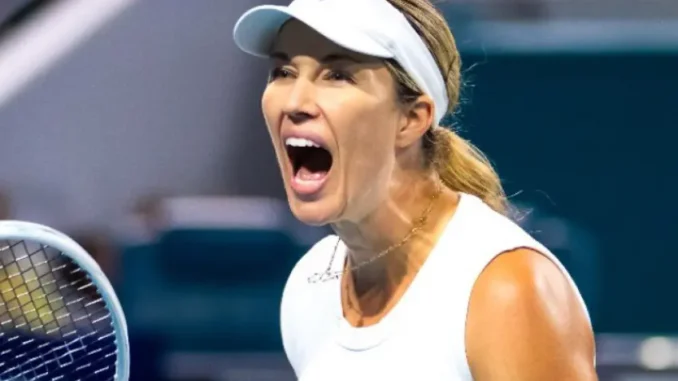
In a dramatic and emotional moment at the 2025 Cincinnati Open, American tennis star Danielle Collins laid bare the physical and mental toll of professional tennis, only to face a wave of online criticism that she fiercely rebuffed. The 31-year-old, once ranked as high as world No. 7, suffered a heart-wrenching first-round loss to compatriot Taylor Townsend, falling 6-4, 7-6(2) in a match that saw her battling both her opponent and a debilitating back injury. A viral video capturing Collins’ mid-match breakdown—where she tearfully shouted, “Why is this happening to me?”—sparked concern among fans but also drew harsh judgment from online detractors, whom Collins sharply called out as “keyboard warriors.”
The match against Townsend was a grueling affair, with Collins fighting valiantly despite the pain of a herniated disc, a condition she later revealed was behind her distress. Down 2-0 in the second-set tiebreak, the 2024 Miami Open champion turned to her team box, her voice cracking with frustration and pain as she cried out, “Why is this happening to me?” The raw emotion silenced the Cincinnati crowd, and the moment, captured by a courtside camera, quickly spread across social media. As Collins exited the court after the loss, she left her tennis bag behind, a poignant symbol of her distress. In a touching display of sportsmanship, Townsend picked up the bag and handed it to Collins’ team, earning praise for her grace under pressure.
Collins, who has plummeted to No. 61 in the world rankings, took to Instagram Stories to address the incident and the subsequent backlash. “Anyone who has a herniated disc knows my pain,” she wrote, shedding light on the physical agony that fueled her outburst. “It’s no surprise the keyboard warriors can’t understand or relate, as they’ve been too busy sitting on their a**es judging people who show up and try to give it their best even on days that suck.” Her words were a powerful rebuttal to those who criticized her emotional display, emphasizing the unseen struggles athletes endure. She also expressed gratitude to her supporters and Townsend, noting, “Thank you to everyone who has been praying for my injury and thank you to Taylor Townsend for being the best of the best.”
This was not the first time Collins has faced scrutiny for her on-court demeanor. Earlier in 2025, she made headlines for confronting a cameraman at the Internationaux de Strasbourg, calling his proximity “wildly inappropriate” as she sought personal space during a changeover. Reflecting on that incident, Collins remarked, “I think what happened in Strasbourg was just me asking for personal space at my workplace. I don’t know why that is even a topic of discussion.” Her candor highlights a recurring theme in her career: a fierce commitment to authenticity, even when it invites criticism.
Collins’ Cincinnati loss marks her third consecutive early exit on the North American hard-court swing, following defeats to Magda Linette in Washington, D.C., and Coco Gauff in Montreal. Her struggles this season, compounded by injuries, have been a stark contrast to her 2024 successes, including a Masters 1000 title in Miami. Despite her ranking drop, Collins remains a fighter, having reversed her planned retirement in 2024 to continue competing. “I started crying,” she admitted earlier this year, reflecting on the emotional weight of her decision to keep playing despite media scrutiny and physical challenges.
The Cincinnati outburst underscores the immense pressure athletes face, particularly when battling injuries. Collins’ emotional transparency—whether screaming in frustration or storming off the court—reveals the human side of a sport often glamorized for its triumphs. Her performance, though a loss, was a testament to her resilience, as she logged seven aces and pushed Townsend to a tiebreak despite her pain. Townsend, the reigning doubles top seed, played a consistent match, winning 71% of her first-serve points, but it was Collins’ raw humanity that stole the spotlight.
As Collins prepares for the US Open, where she is ranked No. 58, her story resonates beyond the court. Her willingness to confront critics head-on and share her struggles with a herniated disc challenges the narrative that athletes must always project invincibility. “The pressures on professional athletes are enormous,” observers have noted, pointing to the mental and physical toll of constant competition. Collins’ fiery response to her detractors and her gratitude toward those who support her recovery signal a player determined to fight on, both against opponents and the “keyboard warriors” who fail to see the full scope of her journey.
Leave a Reply